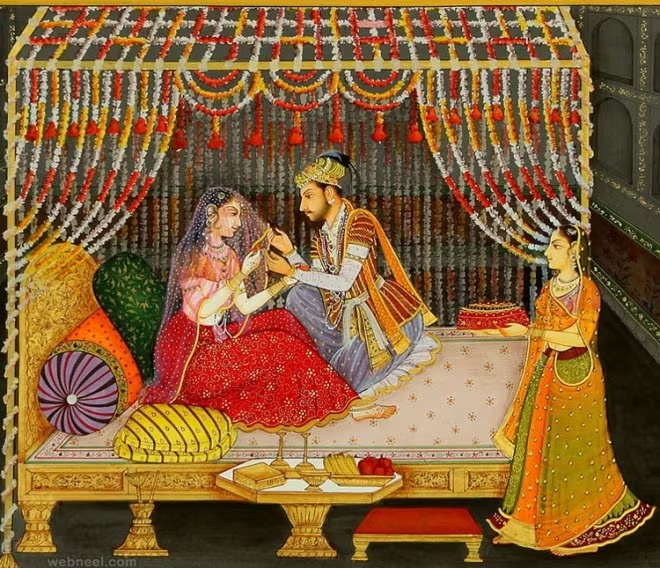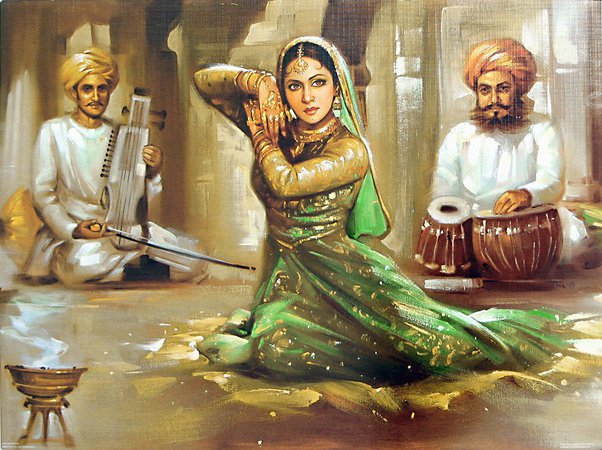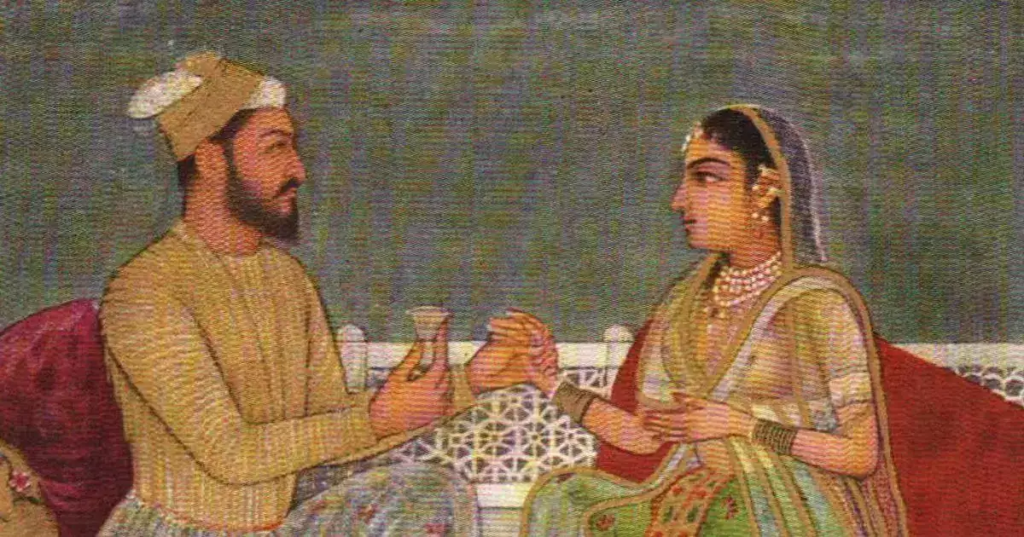
The melody resonated through the grand hall, creating a stark contrast to the usual courtly music. As the last note faded, a hush fell over the room. Aurangzeb, captivated by the raw emotion in her voice, recognized the woman under the tattered cloak: it was Rana-e-Dil.
A cold fury welled up within him. This woman, who had defied him once, now dared to challenge him in his own court. He ordered the guards to seize her, but Rana-e-Dil remained unfazed.
“Emperor Aurangzeb,” her voice rang out, clear and strong, “you may have taken everything from me, but you cannot take away my love for Dara. It burns brighter than any fire you possess.”
Aurangzeb, used to unquestioning obedience, was taken aback by her defiance. He saw not just a woman, but a symbol of everything he had destroyed – Dara’s legacy, his own buried humanity.
Intrigued by her audacity, Aurangzeb offered her a deal. He would spare her life if she agreed to sing for him every night, a cruel attempt to possess a part of what he could never truly have.

Rana-e-Dil reluctantly agreed to Sing
Torn between the desire to preserve her memories of Dara and the fear of a brutal death, Rana-e-Dil reluctantly agreed. Every night, she poured her soul into her songs, each note a lament for her lost love, each verse a rebellion against the emperor who had stolen her happiness.
Aurangzeb, initially captivated by her beauty and voice, slowly found himself drawn to the depth of her emotions. He witnessed the unwavering strength of her love, a stark contrast to the courtly sycophants who surrounded him. He saw a reflection of his own lost dreams in her defiance.

One night, after a particularly poignant song, Aurangzeb broke the silence. “Rana-e-Dil,” he said, his voice gruff, “tell me about Dara. What was he like?”
Rana-e-Dil, surprised by his question, hesitated for a moment. Then, in a voice choked with emotion, she spoke of Dara’s love for poetry, his gentle nature, and his unwavering belief in tolerance. As she spoke, a memory flickered in Aurangzeb’s mind – a younger Dara, sharing a friendly debate with him.
Shame washed over him
For the first time, Aurangzeb saw his brother not as a rival, but as a human being. He saw the love he had destroyed, the life he had snuffed out. Shame washed over him, a bitter aftertaste in his mouth.
The nightly soirees continued, but the dynamic shifted. Rana-e-Dil still sang of her love, but now a subtle plea entered her music, a message for the emperor who held her captive. Her songs became a bridge, reaching out to the buried humanity within Aurangzeb.

a bird trapped in a golden cage
One fateful night, Rana-e-Dil didn’t sing. Instead, she recited a poem about a bird trapped in a golden cage, its song losing its melody with each passing day. The message was clear. Aurangzeb, shaken, understood.
The next morning, Rana-e-Dil was gone. He searched for her, but she had vanished like a wisp of smoke. All that remained was a single red rose, the same color as the one Dara had gifted her on their wedding day, placed on her empty seat.
Aurangzeb never forgot Rana-e-Dil. He continued to rule, but the love story that haunted his court became a constant reminder of his cruelty and his loss.
The defiant dancer remained a symbol of love’s enduring power, a testament to the human spirit that even an emperor could not conquer.
Years later, on his deathbed, a single tear rolled down Aurangzeb’s cheek. It wasn’t a tear of regret, but a tear of longing, a yearning for the love and compassion he had once possessed but ultimately destroyed.
The haunting melody of Rana-e-Dil’s song echoed in the chamber, a final reminder of the love story that had changed him forever.
Categories: story
Marvellous read sir
LikeLiked by 2 people
Thank you so much.
Your words mean a lot.
LikeLiked by 1 person
I didn’t know this sad love story of Rana-e-dil . Well shared
LikeLiked by 1 person
Thank you so much, Priti.
It’s always moving to hear about such poignant tales of love.
I’m happy it resonated with you.
LikeLiked by 1 person
You are welcome. Have you get time to read my book 😁😁
LikeLiked by 1 person
Yes, just started but not yet completed.
I am sorry, I will complete soon.👏👏
LikeLiked by 1 person
No problem 😃 I know you are a gentleman and a very busy person. pritilatanandi783@gmail.com this is my email id. Text me there. 😊 good morning
LikeLiked by 2 people
I have started my U tube channel only 15 days ago I want to share it with you
LikeLiked by 1 person
That is Good . Please send link.
LikeLiked by 1 person
I don’t know how to share link here 😭 I only know how to share in e mail
LikeLiked by 1 person
You can send me as per your convenience, — mail, what sup or any other mean.
LikeLike
Thank you for considering me as Gentleman, actually I am an old man.😊😊
I look forward to reading your book and will definitely text you once I’ve finished. Have a great day!
LikeLiked by 1 person
I am also old 😭😭😭no problem finish it with your convenience. I have no hurry 😞 just asked you. Have a great day 😊😁😃with smile
LikeLiked by 1 person
Thank you so much.
You relieve me from embarrassment.
LikeLiked by 1 person
Ok
LikeLiked by 1 person
Stay happy and blessed.
LikeLiked by 1 person
Thank you 😊 I am very ashamed that I made you embarrassed. I didn’t mean that. Actually I forgot your e-mail id. Nothing else 😑 please don’t mind 🙏
LikeLiked by 4 people
I got your email id 😁 and sent the link 😄😄
LikeLiked by 1 person
I have seen it and subscribed your channel.
All the Best , Here is my video.
LikeLiked by 1 person
Thank you 🙏
LikeLiked by 1 person
You are welcome.
LikeLike
I was just joking.
Stay happy and keep smiling.
LikeLiked by 1 person
Really 😦🥺😦 ha ha ha 😂😂😂 thank you 😄😄 you also keep smiling 😁😁
LikeLiked by 1 person
That is the way to enjoy the moments of our life.
LikeLike